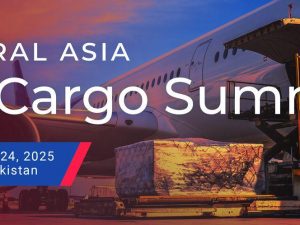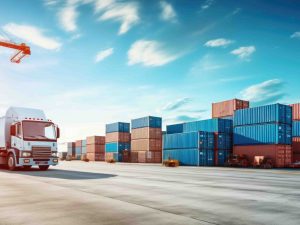Vipin Vohra, Chairman, Continental Carriers said, “BCAS’s relaxation of re-screening norms for transit cargo will significantly cut costs, reduce delays and speed up transfers, especially for international transshipments. By aligning with global standards, it enhances India’s appeal as a transshipment hub, boosts competitiveness, supports express and e-commerce logistics and enables Indian carriers to scale up operations, driving higher cargo volumes through Indian airports.”
Read More »‘Easing cargo re-screening at transfer airports can boost efficiency’
Vandana Singh, Chairwoman Aviation and Cargo, FAII said, “Easing cargo re-screening at transfer airports is a pragmatic step towards improving transit efficiency. While it will help reduce delays and optimise resources, its success will depend on robust implementation and adherence to security protocols. A balanced approach can strengthen India’s air cargo competitiveness while maintaining the highest safety standards”
Read More »‘The decision will reduce dwell time & handling cost’
Balagopal Balachandran, National Head Air Freight, FEI Cargo said, “The directive, issued as Addendum–II to AVSEC Circular No. 6/2024, introduces a unified framework for handling transfer shipments, across international to international, international to domestic, domestic to international and domestic to domestic routes. The transit cargo will be secured using Transfer Cargo Security Hold Areas (TCSHAs), which are secured zones within an airport’s restricted area approved by the Director General of BCAS. This reform reduces dwell time, lowers handling costs, minimises shipment delays and prevent unauthorised interference. Airlines will enjoy a faster aircraft turnaround, forwarders/GHA gain seamless hub connectivity and shippers get greater speed to market. The changes are expected to boost India’s transshipment volumes by approx 8–10 per cent annually. In Global logistics, minutes mean millions and India is now racing ahead to claim a bigger slice of Regional cargo flows.”
Read More »‘Faster processing will boost express logistics, e-commerce growth’
Kamal Jain, Director, Cargomen Logistics said, “Relaxed cargo re-screening rules in India are set to transform the air cargo industry by eliminating redundant X-ray checks at transfer airports. Under new BCAS guidelines, secure shipments sealed and held in Transfer Cargo Security Hold Areas can bypass re-examination, cutting ground delays and handling times. This streamlining reduces operational costs, boosts cargo throughput and enhances reliability, positioning India as a competitive air freight hub alongside Dubai and Singapore. Faster processing will accelerate express logistics, fuel e-commerce growth and help Indian airlines capture more high-value transshipment cargo, all while maintaining strict security through advanced surveillance, secure zones and real-time tracking. This balance of efficiency and safety marks a major leap forward for India’s cargo ecosystem. Though there are risk in bypassing the double check but it will be mitigated through rigorous checking at origin.”
Read More »‘Cargo that has passed global security protocols must move seamlessly’
C K Govil, President, ACAAI said, “Why should cargo that has already been security cleared in Australia be re-screened in India when transiting to Europe or America? Nowhere else in the world is such double screening mandated. It adds unnecessary costs, causes delays, risks missed connections and burdens the industry with public charges. If India aspires to become a global logistics hub and meet the Hon’ble Prime Minister’s vision, such outdated practices must be eliminated. Cargo that has passed global security protocols must move seamlessly through Indian airports.”
Read More »Tashkent to host 2nd Central Asia Air Cargo Summit
To boost air cargo in Central Asia which has emerged as one of the fastest-growing air cargo regions in the world, the second edition of Central Asia Air Cargo Summit is being held in Tashkent, Uzbekistan from 22-23 September 2025. With over 40 airlines, cargo operators, tech innovators and policy leaders joining, the Summit will bring the region’s momentum into sharp focus — and help shape the next phase of its development. The event is organised by ATO COMM, an events management company based in Ljubljana, Slovenia. Uzbekistan has more than doubled its air cargo volume from 2020 (40,000 t) to 2024 (85,000 t), with projections of 120,000 t capacity by late 2025 thanks to the expansion of Tashkent International Airport’s new cargo complex. Kazakhstan, the region’s largest market by volume, handled 92,600 tn in 2023 and continues to attract transit cargo due to rerouted flows from Russian airspace and excellent geographic position. Kyrgyzstan saw explosive growth: air cargo increased nearly 40-fold between 2022 and 2024, driven by transit demand and re-export flows. My Freighter and Centrum Air(Uzbekistan-based) added over 20 widebody freighters and passenger aircraft since 2022, expanding reach to 20+ international destinations. Uzbekistan Airways modernised its cargo fleet, transporting 59,276 t of goods in 2024 — a 22% YoY increase. New private airlines like Air Samarkand, Alpha Sky, and Altair Airlines are helping diversify the market, signalling growing liberalisation and competition.
Read More »USA imposes 25% additional tariffs, PM calls it ‘unfair’
USA has announced an extra 25 per cent tariff on India as penalty for the continued import of Russian crude oil. He had earlier threatened tariffs of 100 per cent unless a peace deal is signed by August 9. However, India has strongly criticised the decision taken by USA President, calling the move ‘unfair, unjustified and unreasonable.’ India will never compromise on the interests of its farmers, livestock rearers and fishermen brothers and sisters. I know personally that I will have to pay a heavy price for this, but I am prepared for it,” the PM said in a statement.
Read More »Galaxypacs to go live on Amazon, Flipkart on 1 Sep
Galaxypacs, the packaging solution-oriented sister venture of Galaxy Freight is all set to go live on Amazon and Flipkart as an online seller of premium custom-made packaging solutions including UN approved DG packing solutions, on 1 September, 2025. “Through this novel initiative, our packaging solutions will be available at the fingertips of our users and potential clients all across the world. They just need to click on the desired option and order it to their address, and we will deliver it to their doorstep,” said a statement. Galaxypacs India LLP specialises in packaging solutions. We offer UN-approved 5-ply, fiberboard corrugated boxes certified by ERRL Singapore, complying with ICAO and IMDG regulations. These packages are suitable for multimodal transportation. In addition to standard packaging, Galaxypacs provides customised solutions, including corrugated boxes, HDPE drums, fiberboard drums, wooden crates, and metal drums for various projects, charter services, and dedicated products. The company also offers dangerous goods (DG) repacking solutions for solid materials, either at the shipper’s facility or in its own warehouses. Furthermore, Galaxypacs supplies primary inner packing materials, palletisation, fumigation services, and DG labels. Our qualified DG team is available to provide timely consultation to shippers so that they can optimise their packing for air and sea freight. With prompt advice and comprehensive packaging solutions, Galaxypacs is a one-stop shop for all packaging queries across 14 major trade stations in India,” the statement read.
Read More »GSV, SAP Labs unite to boost digital literacy
Gati Shakti Vishwavidyalaya (GSV) and SAP Labs inaugurates Innovation Park at Devanahalli, Bengaluru, Karnataka to enhance digital literacy. This significant milestone not only marks SAP’s continued investment in India’s digital future but also reinforces the country’s position as a global technology and innovation hub.
Read More »‘It’s a threat to India’s export competitiveness‘
Vipin Vohra, Chairman, Continental Carriers said, “The US decision to raise tariffs on Indian goods to 50 per cent poses a severe threat to India’s export competitiveness, especially in textiles, apparel, gems, jewellery and chemicals—sectors that contribute significantly to employment. Countries like Bangladesh, Vietnam and China will now enjoy a duty advantage, making Indian products less attractive in the US market. With nearly $8 billion in exports exposed, the impact could be deep, triggering job losses, especially among MSMEs and labor-intensive industries. Immediate government support, export diversification, and strategic dialogue with the US are critical to cushion the blow and protect India’s trade and employment base.”
Read More » Cargo Breaking News
Cargo Breaking News








